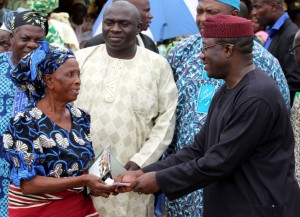
L-R: A beneficiary, Mrs. Folashade Olokesusi; member, State House of Assembly, representing Ise-orun, Mr. Idowu Alabi; and Ekiti State Governor, Dr Kayode Fayemi, at the flag-off of the State's Social Security Scheme, in Ise-Ekiti
One must give credit to the present crop of state governments for some of the new innovations in governance and social engineering that Nigeria now witnesses. Of particular interest to this writer is the quiet social security programme that has been innovated by the Ekiti State government under Dr Kayode Fayemi.
It is indeed a programme that should remind every observer of the track record of the governor himself. A time there was, when Abacha appeared to be winning the war against democracy. He had just survived 17months of NUPENG strike.
Distrust had crept in on the pro-democracy movement and people were wondering whether it was not better to carry on as usual. That was when Radio Kudirat made its debut to give fresh fillip to the pro-democracy enterprise. It is vintage Fayemi to introduce a revolutionary project like Owo Arugbo in Ekiti State.
By this programme, elderly people who have no pension and have no viable means of sustenance are registered, screened and paid a monthly stipend. The bill comes to some 200million naira a month, a considerable strain on the modest till of a state like Ekiti. This however, is one little step that means so much to all of us. It is indeed a mighty leap in social engineering in this part of the world.
We have lived long enough with a society that refuses to look out for its less fortunate members. On the unemployment queue, able bodied and highly qualified young men and women age away looking for non-existent jobs, while society looks the other way. The door literally shuts in your face when you cannot earn an income. It is even worse when you are disabled or aged.
Workers and various segments of civil society bicker endlessly about minimum wage, forgetting those who have no wage to earn.
It has been argued quite eloquently that this heartlessness is a major foundation for corruption in Nigeria as people loot for the rainy day. For those who have had the privilege of high office, life is even more bitter without a considerable stash of illicit lucre to help keep up appearances. You are either rich or dead.
This is a contrast to other societies where considerable attention is paid to the well-being of the sick, the poor and the aged. In those serious nations, the long and comforting arm of the state is around every citizen, high, low, rich or destitute. Patriotism in such places is not a rare virtue.
A society that can produce the Dangotes, Ibrahims and Otedolas of this world; a society that easily produces people who can play with 3 million dollars as bribe, should be able to spare some grains for the table of the average roadside beggar. The trenchant message is that it is the same commonwealth. JF Kennedy put it more effectively—‘If a free society cannot help the many who are poor, it cannot save the few who are rich’. That is the ground norm of the social contract that we turn upside down as we live and let die. Europe has made it a basic legal duty of the state to cater for this class of citizens. It is no longer a matter of social policy [see Article 8 of the European Convention on Human Rights]. We can no longer live the way we do as a society.
The Ekiti revolution is obviously in its infancy. There is still a massive crowd of unemployed [and even unemployable] school leavers who need help. An annual training of such people, with a token to help with cleaning the suit, and preparing for the next interview should be a step in the right direction. While the state may not be able to provide immediate employment for every unemployed citizen, it should tell them in plain language that it recognises their plight and identifies with them.
Fayemi has proved two critical points. The first is that for a great project like this, and indeed to really make a difference in society, what you need usually, is a large heart rather than a large purse. The second point is that you can always start small.
It must be acknowledged that a benefit system usually comes with its own peculiar problems like uncontrolled immigration, voluntary unemployment and allied frauds, the benefits outstrip these disadvantages at all times.
One last argument for the immediate nation-wide adoption of a welfare system is that 14 years ago, Nigeria barely earned 10billion dollars a year. Today, that sum has increased eight times without any impact on the poor. Why can’t we spare a small portion of this to look after our poorest citizens who for reasons of disability and inability have no wage to earn? Time we appreciated the difference between a great nation and a big nation.
Dapo Ogunwusi, former Editor, Nigerian Tribune, is CEO, Gems Communications, England.
This article was first published in The Nigerian Tribune on July 18, 2012.
Last modified: July 18, 2012
